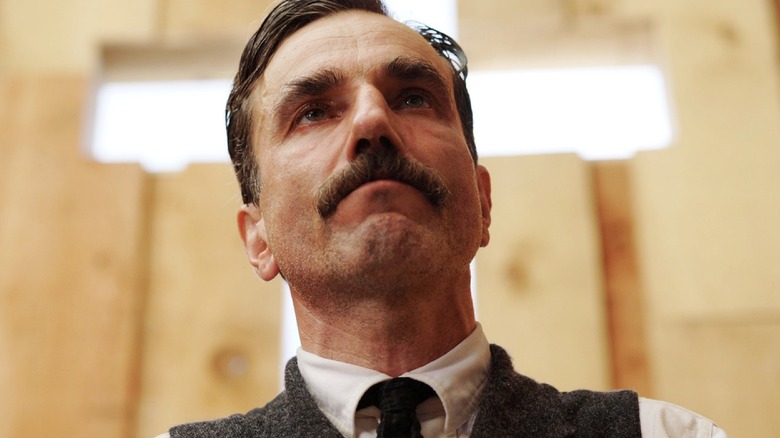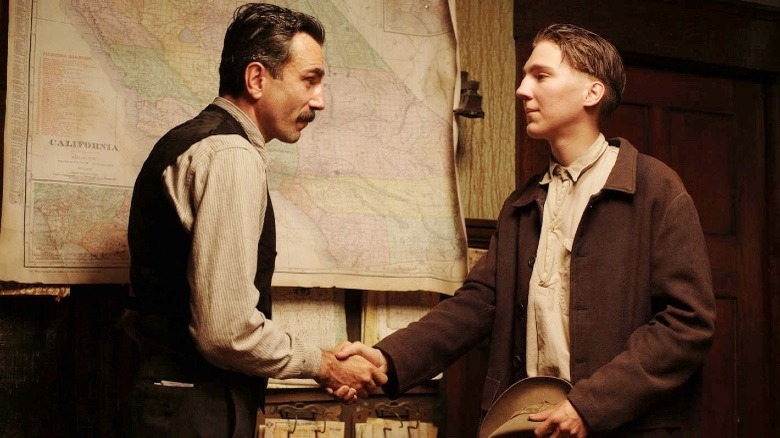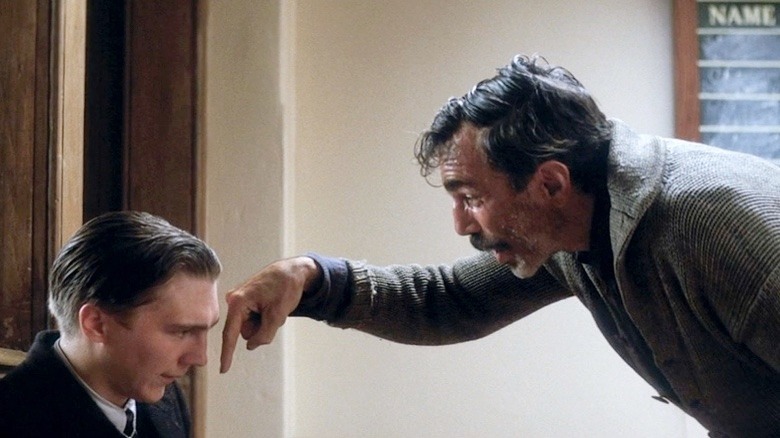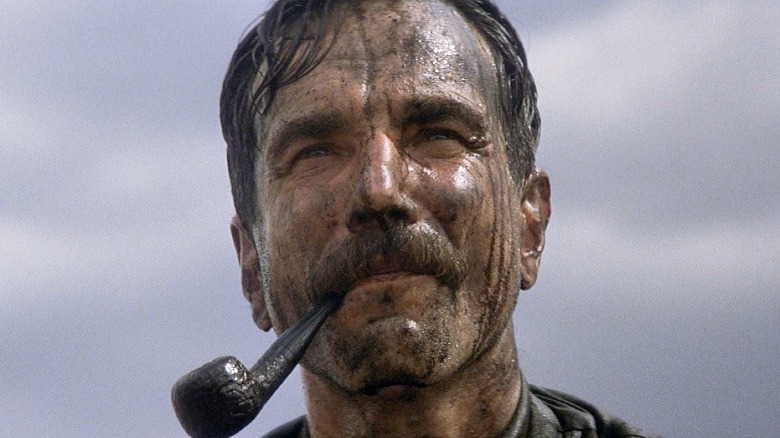There Will Be Blood Ending Explained: Capitalism Drinks Everybody's Milkshake
P.T. Anderson's "There Will Be Blood" marked a turning point in the celebrated filmmaker's career, transitioning him away from the kinetic style and occasional surrealism of his earlier work ("Boogie Nights," "Punch-Drunk Love") and into a period of directing more subdued movies ("The Master," "Inherent Vice") — from their long, deliberate takes to their washed-out visuals and stories that are firmly rooted in realism, save for when characters are tripping out or lost in the haze of their memories.
That's not to say Anderson has only made serious films since "There Will Be Blood" came out in 2007. On the contrary, his movies "The Master" and "Phantom Thread" are fascinatingly bizarre relationship dramedies at their core, while "Inherent Vice" is a spiritual descendant of shaggy dog comedies like "The Big Lebowski." Even "There Will Be Blood" is full of dark humor, the most infamous example of which would be the much-parodied, oft-memed, "I Drink Your Milkshake!" monologue from the film's climax.
But how does "There Will Be Blood" get from Daniel Plainview (Daniel Day-Lewis) mining the depths of the earth for silver to drunkenly using milkshakes to explain the concept of drainage before chasing his arch-nemesis, Eli Sunday (Paul Dano), around his personal bowling alley and killing him with a bowling pin? And what does any of this have to do with American political activist and muck-raking writer Upton Sinclair? Let's break it down.
Industry v Religion: Dawn of America
Outside of an extensive prologue showing how Daniel evolved from a driven silver miner into a scheming oil prospector, "There Will Be Blood" centers on the decades-spanning rivalry between Daniel and Eli. The pair first cross paths in 1911, after Eli's twin brother Paul tells Daniel about the oil beneath his family's property in California. In return, Daniel gives Paul enough money to help him launch a "prosperous little business" of his own, as Daniel reveals gloatingly to Eli during his "milkshake" rant.
Upon entering negotiations with Eli and his father to buy their family's land under the pretense that he wants to hunt quail on it, Daniel quickly recognizes a kindred spirit in Eli, himself a preacher who claims to be a healer. In truth, of course, Eli is as much a spiritual person as Daniel is a family man (he runs a business with his son H.W., whom Daniel adopted after his real father died in an oiling mining accident). For them, faith and "family values" are just a means to gaining more wealth and power.
Over the years that follow, Eli and Daniel never miss a chance to humiliate one another, whether it involves Daniel furiously beating Eli in public or Eli forcing Daniel to repent in his church for abandoning H.W. after an accident left him deaf. Yet, just like industry defeated religion to become the institution that shaped America in the 20th century, it's Daniel who gets the last laugh.
I Am the Third Revelation!
By the time Eli and Daniel reunite in the movie's final scene, Daniel has destroyed what was left of his relationship with H.W. and lives as a booze-swilling recluse in a mansion. Eli, on the other hand, is a radio preacher in dire need of funds after losing money in the Wall Street Crash of 1929. As such, he's willing to denounce himself and his spiritual beliefs as superstition for Daniel's amusement in exchange for the latter paying Eli for the rights to the last piece of land he never drilled in Eli's hometown. Cue the spit flying from Daniel's mouth as he gleefully explains the land is devoid of oil because "DRAINAGE!" and proceeds to murder Eli in an almost comically horrifying manner.
The point is that Daniel "wins" by being the ultimate capitalist and seeking victory in his contest with Eli by any means necessary. Yet, just as Daniel drained Eli's hometown of the oil beneath its surface, capitalism has robbed him of whatever humanity he ever had and turned him into an utterly terrible person. When Daniel roars that he's the Third Revelation while chasing Eli around his manor, it's his way of declaring he's the true vessel for God and has carried out God's will by embracing capitalism as the religion of the future. Meanwhile, Eli's mistaken belief that his phony spirituality was the key to satisfying his own greed has cost him, quite literally, everything.
How There Will Be Blood Differs From Oil!
As much as "There Will Be Blood" acts as an allegory for 21st century capitalism, it originated with a book entitled "Oil!" written in the 1920s by Sinclair. Best known for his 1906 novel "The Jungle," which exposed the grotesquely unsanitary conditions of the U.S. meatpacking industry, Sinclair penned "Oil!" as a way of satirizing the Teapot Dome scandal — wherein the Harding administration accepted bribes from private oil companies. It was the most notorious scandal in U.S. political history until, y'know, that little incident with the Watergate complex.
"There Will Be Blood," as Anderson has pointed out, only sorta adapts the first 150 pages of "Oil!" (a book that's 528 pages long) before heading in a very different direction. And even then, the movie features some big changes from its source material, like making Daniel the protagonist, unlike his counterpart in Sinclair's novel. Similarly, Eli and Paul are not twins in "Oil!" and do not act as flip sides of the same coin (one embracing old-school faith, the other becoming a capitalist) in their pursuit of fortune.
Admittedly, Anderson changing Eli and Paul's last name to "Sunday" wasn't exactly an unsubtle way of underlining their roles in his film's meditation on industry and religion (same with giving Daniel the surname "Plainview"). Still, it's reflective of how "There Will Be Blood" successfully transforms the story in "Oil!" from a satire of a specific incident into a timeless parable that still packs a punch.



